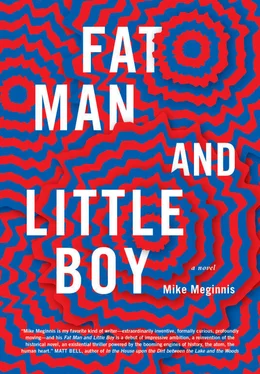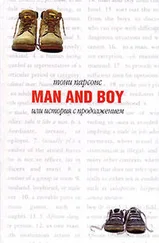Matthew looks glum. “Will it be in French?”
“All English. You need to practice your French, though, so I wish it were otherwise. You’ve really hit a rut.”
Matthew nods. “It’s hard.”
The lights come down. The audience quiets. Purses snap closed. Someone somewhere is chewing peanuts. The screen lights, gray sky and charcoal clouds, the dark underbelly of a bomber, like a whale, scratched and pockmarked by flak or bird bones. The hatch comes into view, through which the flyboys drop the bombs. The hatch is closing. A young boy leans over the edge, looking down on the audience with a mirror of John’s stupid hanging jaw. The hatch is closed. The plane’s tail floats past. Empty sky. Now three fighter planes in profile—one very close, only a nose and the rise of a cockpit, pilot a shadow; one further back, center-screen, partly obscured by the first, pilot a smudge; one still farther back, above the others on the flat plane of the screen though in fact it is level with them, very far, small, visible in its entirety. The title comes up on the screen. THE ACE: Roman letters cut from granite. The farthest plane begins to smoke, and falls, leaving a black trail. The nearest plane explodes without sound. All its little pieces. The camera jitters and calms like an animal. The title fades.
The opening credits introduce the cast. There’s only one real star, an older man playing a colonel with a neck of steel. The rest are newcomers. The Ace comes last. There are two names by his credit. He was played by Able and Baker Hanway. The Ace smiles at the camera, his eyes lowered, and then they click into place. Even on black-and-white film you can tell that they’re blue. So blue.
“Why are there two names?” whispers John.
“They’re twin brothers playing the same role,” says Rosie. “They’re supposed to be very good.”
“Which one are we seeing now?”
“Can’t tell,” says Rosie. “They’re identical.”
“Completely identical?”
“Shh.” She touches his wrist.
The Hanway brothers look nothing like her dead husband. They are, or he is, whichever one now in this scene, like a corn-fed Gregory Peck fifteen years younger, the same painful-pretty face, cheekbones, but hidden underneath a thin layer of sugar fat, bunching up just slightly underneath the chin, like a fold of margarine; his skin (their skin) white like the light of the moon but not the moon itself, thick curly thatch of hair held this side of reason by a styling grease. They have wide, sloping shoulders, muscle-fatted thighs. She read they were from Indiana.
John says, “He’s very handsome.”
Rosie says, “They are. But we’re not to talk during the film. It’s rude.”
She touches his hand. He turns it belly-up to welcome hers. His hand says, You can stay. Her hand says, It’s a kind offer. She touches the middle of his palm and withdraws, slips her hand in her pocket. Seems that’s where it belongs. She can feel her own pulse in her fingertips.
The movie proper begins with a mother receiving a letter. A soldier has brought it to her, his rank uncertain. She thanks him—the audience cannot hear this, but sees it by the inclination of her head—and takes the letter inside to read alone at the table. Where is her husband? Where are her sons? The house is empty. There’s a clock shaped like Felix the Cat on the wall, smiling, wagging its tail. The hour chimes. She opens the letter.
The plot is easy to lose. Half an hour in Rosie comes to understand the mother has received notice her son, Danny Ericson, is a hero. This is news to the mother because—although she never quite comes out with it—she’s always thought he was basically a loser. At home, word spreads about his heroism while his exploits continue in various theaters. Girls who never had an eye for him before suddenly take an interest; they follow him closely in the papers, which feature regular front-page articles on his many kills and daring maneuvers. They dub him The Ace. Some people speculate about the number of medals he’ll get when he returns. Others speculate about his potential for politics, for film. In one seemingly endless scene, a Hollywood director invites himself to dinner with Danny’s parents, squirming visibly as he forces himself to choke down a full plate of green bean casserole.
Incredibly, all this takes place without dialogue. The scenes at home feature few sounds, usually drones or chimes of one sort or another, but no human speech at all. There is, however, a rising mechanical sound, at first a distant buzz that gradually grows louder, closer, more oppressive, becoming a chug and then a roar: the sound of a fighter plane’s engines.
At war people can speak, though.
The Ace begins the movie with a number of friends of various ages and origins. There’s the Texan pilot with the big chin, the half-Indian pilot who brings along on every flight a sharp little knife with an eagle feather hanging from the handle. There’s the runty freckled kid whose engines keep stalling—the first to die, inevitably. There’s the tall one with the dark hair and the soulful eyes, whose American name, Ed, does nothing to temper the impression that he is probably a Jew. Gradually The Ace’s friends all die, shot down over the Pacific, exploded.
He takes it hard at first. Those Hanway twins can cry. When the first friend goes down The Ace threatens not to fly anymore. His handsome, no-nonsense commanding officer tells him it doesn’t work that way. “You don’t quit war,” says the commanding officer. “It’s not like working at the drugstore slinging milkshakes.”
So The Ace goes back up and shoots down a few more Japanese. Then the Texan dies. The Ace weeps openly in the mess. His tears fall on his mashed potatoes and cornbread. Again, he threatens to quit. His commanding officer says, “You’ll quit when you’ve killed every blasted Japanese in the rim, and not one second before, airman.”
So The Ace goes back up and shoots down a few more Japanese. This time the maybe-Jew buys it. When they land The Ace can barely work up any tears at all. He eats his whole tray in the mess. The commanding officer comes by to touch his shoulder. He says, “Stay strong. We need you.”
Finally it’s just The Ace and the half-Indian with his knife up there. They don’t ever talk to each other in the entire movie, but exchange stoic nods and one very intimate instance of eye contact, on leave, in a bar, where they both drink too much.
The strange thing about the movie is that though new pilots do seem to replace the ones who go down, they never show up in the lengthy, exhausting air combat sequences. The Ace is more and more alone. There are five American planes in the beginning, and in the end, after the half-Indian dies, it’s just The Ace, fighting what seem to be dozens of Japanese planes, shooting down one after another. In the plane his eyes are steely blue. He is determined not only to live, but to kill.
Did Frank ever look like that? Did he knowingly decide to extend his life at the cost of another, or did it come as a surprise every time, right up to the end? Rosie can’t stand to picture her husband wearing that expression. It might be—she hopes it is—that no one can wear that face except inside a plane, or some other military machine, which her husband never piloted, never drove.
The expressions and personalities of ace-pilot-Danny and mourning-grounded-Danny converge over the course of the film, until the hard expression is with him always, even while he eats and drinks. Now he flies missions alone. Soon he’ll win the war, and then he can go home, and then there will be banquets in his honor, parades.
He never flies again. The next day comes the news of a bomb dropped on Hiroshima. Japan’s surrender is inevitable. A few of the boys get some work, but never The Ace. He spends most of his time in his bunk reading cowboy paperbacks.
Читать дальше












